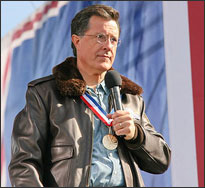Political humor has a long tradition in America, but ironical “fake news” is a phenomenon that distinguishes the current cultural moment. Indeed, in recent years a whole body of scholarly literature has focused on this field of political entertainment and its effects. A 2011 study from scholars at Ohio State University adds to this literature by examining how precisely such satire registers differently among liberals and conservatives — how humor is filtered through certain predispositions.
The study, published in the International Journal of Press/Politics, “The Irony of Satire: Political Ideology and the Motivation to See What You Want to See in The Colbert Report,” used data gathered from 332 college-aged participants in an online survey to determine how their responses to clips from The Colbert Report correlated with their political affiliations. Ultimately, the researchers discuss the potential that the dynamics observed have on strengthening preexisting attitudes and broader political polarization.
The study’s findings include:
- Overall, the research indicates that the “ambiguous deadpan satire offered by Stephen Colbert in The Colbert Report is interpreted by audiences in a manner that best fits with their individual political beliefs. While common wisdom might suggest that this is simply comedy and people should ‘get the joke,’ this study demonstrates that such assumptions do not seem to hold true when the source is also ambiguous, offering no external cues to guide individuals’ message processing.”
- Upon watching a clip from the show, self-reported strong conservatives recounted having processed Colbert’s statements (which satirically targeted liberals) as representing Colbert’s true feelings.
- Additionally, conservatism among the subjects positively predicted perceptions that Stephen Colbert was himself a “Republican.”
- There was no statistically significant difference between liberals and conservatives in how “funny” they reported Colbert to be, indicating that the humor was not lost on either audience, just the perception of at whose expense the joke was made.
The authors conclude that the results “raise questions about the influence of shows that parody and satirize the political actors, groups, and belief systems such as South Park, The Simpsons, and Saturday Night Live, suggesting that regardless of joke intent people will potentially see what they want to see.” Moreover, the researchers state, “the major point this study raises is that while both groups of people know it is comedy and presumably watch it to be entertained, there are stark differences in how they see the comedy, who they think is being satirized, and how those differences polarize the electorate by reinforcing their own set of beliefs as valid and the opposing set of beliefs as laughable.”
Tags: campaigns and media


Expert Commentary